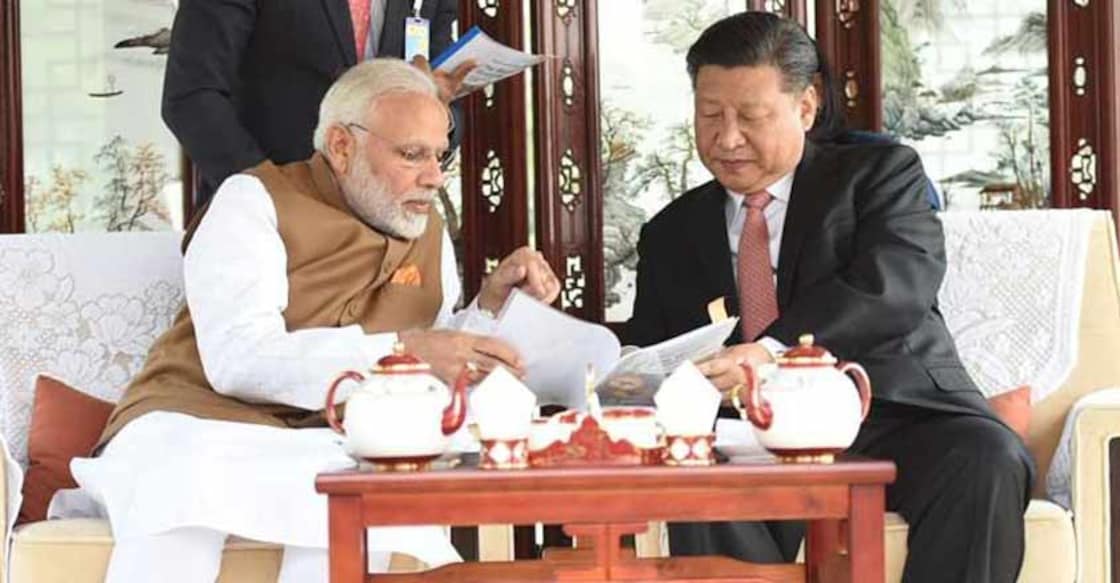Column | US-China trade war to loom over Modi-Xi meet next month

Mail This Article
Sands and stonework of Mahabalipuram are likely to see momentous discussions to chart the course of world trade, especially involving India, China and the United States next month. India Prime Minister Narendra Modi is scheduled to meet with Chinese President Xi Jingping from October 10 to 12 for more than one agenda-less session for their second informal summit. Next week Modi is set to meet American President Donald Trump when they will discuss the trade wars, including India's own differences with the US on this count. Mahabalipuram is the venue preferred by the Prime Minister's Office, though an official announcement will come closer to the summit date.
The leaders would want to consolidate the Wuhan spirit in a world which has become more complicated after their first informal summit which lasted for over eight hours in the Chinese city. They cleared the misunderstandings over the tense confrontation over Chinese troops entering Doklam in Bhutan, and breathed a new life into the bilateral relations. Now they meet once again in an atmosphere tensed by two developments: the intense trade war between American President Donald Trump and Xi, as well as China's support to Pakistan for internationalising the Kashmir decisions of the Modi government.
According to external affairs ministry's planners, the cool breezes of the Bay of Bengal would soothe the mood between the two leaders. External Affairs Minister S Jaishankar who is spearheading the preparations for the summit has already indicated that the government is worried about the huge trade deficit, as Indian exports are not ordered at the same level of Chinese imports into India. But the delay in the talks between US and China could cast a shadow on an agreement in Mahabalipuram as the former wants India to support Washington in pressurising Beijing.
Meanwhile, Union Commerce Minister Piyush Goyal is working on the regional commercial and economic treaty with ASEAN and other East Asian countries, which would be the first free-trade agreement to be signed by India outside South Asia. There are apprehensions among state governments and farmers' organisations about a trade agreement which may lead to the dumping of agricultural goods into India. Goyal has said tariffs would be worked out in such a way that Indian interests are not affected. Kerala was among the state governments which protested at the finalisation of the free-trade agreement with European Union nine years ago by the Manmohan Singh government and the agreement was not signed.

Modi who has a wish to showcase the entire country to his foreign guests has taken considerable interest to locate newer venues for his summit meetings. In fact, when he invited Xi for the first time to India, Modi chose the Sabarmati waterfront in Ahmedabad which he had developed as chief minister. Xi sat in a swing, tasted Gujarati vegetarian food and visited the Sabarmati Ashram, founded by Mahatma Gandhi. Modi took Japanese counterpart Shinzo Abe to his Lok Sabha constituency Varanasi for an evening maha aarati on the banks of Ganga, and a boat ride in the river in late 2015,. The BRICS summit in Goa in 2018 was attended by Presidents of Brazil, Russia, China and South Africa, along with Modi. Interestingly, when India hosted a summit of heads of government of the world's smallest islands, facing threat due to climate change, Modi chose Jaipur, the city closer to the desert than the sea. They had a taste of Rajasthan culture and cuisine, and were attired in the bright colours of the desert people.
Apart from trade, Modi would be discussing the far-reaching changes made by his governments in August in the status and powers of Jammu and Kashmir state, which has been split into two Union Territories, and its special provisions under Article 370 have been withdrawn. China's all-weather friend Pakistan has taken the issue to international fora saying there is complete denial of democratic rights to the people of Kashmir Valley, and it has Chinese support. Modi, who has convinced major leaders like Trump, Abe, Russia's Vladimir Putin, Germany's Angela Merkel, Britain's Boris Johnson and France's Emmanuel Macron during the G7 summit in Europe as well as during bilateral visits to France and Russia, would like Xi's support so that Pakistan is more isolated. But given the close relation with Pakistan, and also China's own claims on large parts of Ladakh, Xi may at best be noncommittal.



